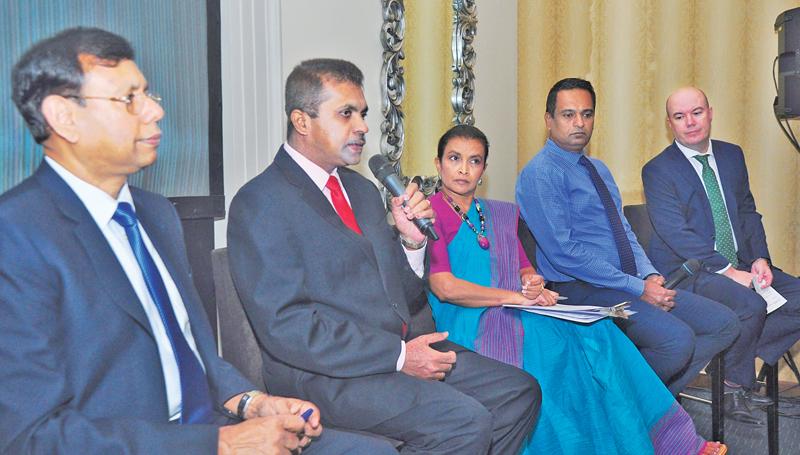
Environmental catastrophes will aggravate causing colossal losses to countries if the current 400 parts per unit Carbon dioxide (CO2) equivalent of atmospheric concentration further increases, International Union for Conservation of Nature (IUCN) Country Representative Dr. Ananda Mallawatantri told the media at the launch of a project to support strategy development for a greener apparel industry in the country last week.
The project to crystalise a cohesive low carbon development transition strategy for the local apparel industry is a joint initiative of HSBC and International Union for Conservation of Nature (IUCN) Sri Lanka Country Office.
The strategy will be developed in partnership with the Joint Apparel Association Forum of Sri Lanka (JAAFSL), National Cleaner Production Centre (NCPC) and the Board of Investment (BOI) based on research conducted by IUCN.
“The world is already battered by climate related disasters which has led to depletion of resources and poverty levels rising across the globe. A concerted effort must be made within nations to bring down the carbon emission level to at least around 300 parts per unit and that could be done by adhering to the Paris Agreement and abiding all norms and conventions governing the environment,” Dr. Mallawatantri said.
The Paris Agreement is within the United Nations Framework Convention on Climate Change, dealing with greenhouse gas emissions mitigating adaption and finance singed in 2016.
The agreement seeks to keep the increase in global average temperature to well below 2 Celsius above the pre industrial levels and to pursue efforts to limit the increase to 1.5 Celsius recognising that it would reduce the risks and impacts of climate change.
“During the strategy development process, IUCN Sri Lanka will partner with JAAF, NCPC and the BOI to generate and validate information. Consultations envisaged during the strategy development will include regulatory agencies, apparel industry senior managers and technical level staff, environment auditors who are familiar with the industry operations and processes. We will also review the international knowledge bases on the subjects involved,” Dr. Mallawatantri said.
HSBC Sri Lanka and the Maldives CEO Mark Prothero said the apparel industry is a critical income earner for Sri Lanka, and supporting its transition into greener development is imperative for the growth and long term stability of the industry.
With this project, HSBC is moving beyond transactional corporate social responsibility to more a knowledge-based contribution that benefits the communities, the environment and the country at large.
We believe that knowledge based intervention is the best way to ensure that change is impactful and sustainable in the long run.”
HSBC pledged USD100 bn in 2017 for sustainable financing and in practice this translates to HSBC being a leading global partner in financing, managing and shaping the transition into a low carbon future.
HSBC is committed to finance projects which will help deliver 2015 Paris Climate Agreement and the UN Sustainable Development Goals (SDGs).
Sustainable financing in the apparel and garment sector has the potential to contribute to several UN Sustainable Development Goals (SDGs), namely, SDG6: Ensure availability and sustainable management of water and sanitation for all; SDG9: Build resilient infrastructure, promote inclusive and sustainable industrialisation and foster innovation; SDG11: Making cites and human settlements inclusive, safe, resilient and sustainable; and SDG13: Take urgent action to combat climate change and its impacts.
The HSBC Group provides retail banking and wealth management, commercial banking, global banking and markets and Global Private Banking through its offices in 65 countries.
IUCN, International Union for Conservation of Nature, helps the world find pragmatic solutions to our most pressing environment and development challenges by supporting scientific research; managing field projects all over the world; and bringing governments, NGOs, the UN, international conventions and companies together to develop policy, laws and best practice.
